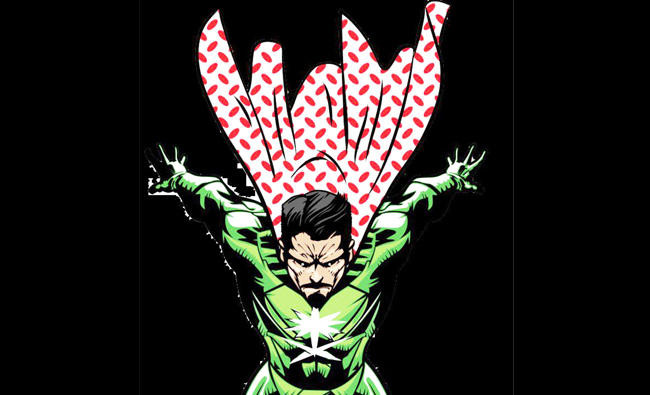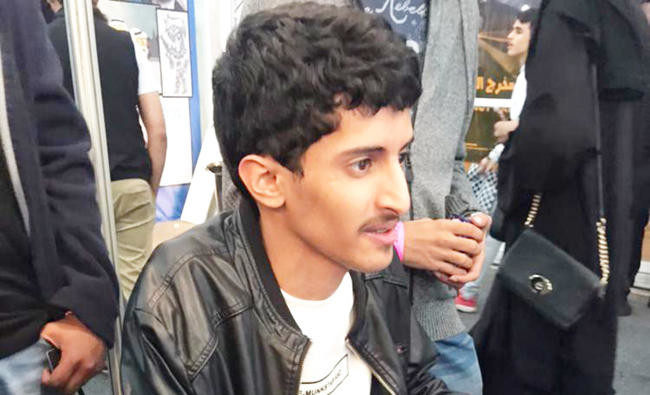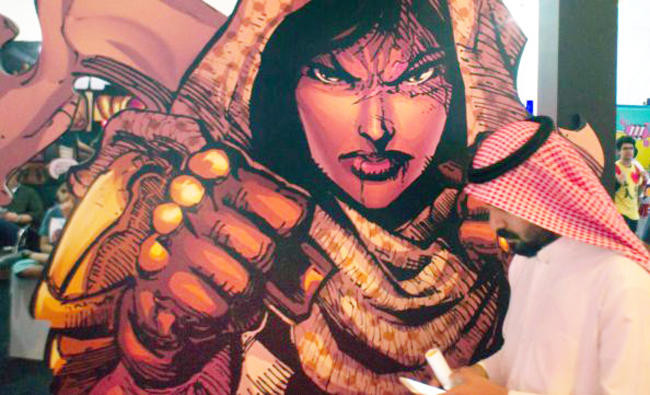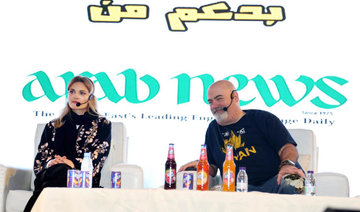RIYADH: The first modern Arab comic, “The 99,” created by Kuwaiti psychiatrist Dr. Naif Al-Mutawa and featuring a team of superheroes with special abilities based on the 99 attributes of God, was published by Teshkeel Comics in October 2010.
Al-Mutawa was not the first to create superheroes in this way. A number of modern superheroes are based on Greek and Norse mythological figures such as Heracles and Thor while others are built on action heroes gifted with special powers such as Superman or Batman.
The characters in “The 99” include Dr. Ramzi, a scholar and social activist, and the 99 youngsters with special abilities given to them by the “Noor” gemstones, which were lost during the Mongolian invasion of Baghdad.
The evil characters are led by the power-hungry Rughal, who tries to steal the power of the Noor stones for himself. The storyline shows the 99 characters led by Dr. Ramzi in pursuit of social justice and peace against the forces of evil.
The adaptation of superheroes in Arab culture is considered by many to be modest, apart from a few examples such as “One Thousand and One Nights,” “Sinbad the Sailor” and “Aladdin,” which had the usual stereotypes of turban-wearing Arabs riding camels and fighting with curved swords.
In spite of this stereotyping in the entertainment industry, Arabs and Muslims do exist in American comics as superheroes, such as Kamala Khan, who is a Pakistani American superhero known as “Ms. Marvel,” Simon Baz, the Lebanese American who becomes the first Arab member of the Green Lantern Corps, and Sooraya Qadir (Dust), a mutant from Afghanistan who becomes a member of the X-Men.
The rise of the Arab superhero — It all started with ‘The 99’
The rise of the Arab superhero — It all started with ‘The 99’

Saudi project clears 607 Houthi mines in Yemen

- The total included 561 unexploded ordnances, 21 anti-personnel mines, 20 anti-tank mines and five explosive devices, according to a recent report
RIYADH: Members of Saudi Arabia’s Project Masam removed 607 explosive devices from various regions of Yemen last week.
The total included 561 unexploded ordnances, 21 anti-personnel mines, 20 anti-tank mines and five explosive devices, according to a recent report.
Ousama Al-Gosaibi, the initiative’s managing director, said a total of 486,108 mines had been cleared since its inception in 2018.
The explosives were planted indiscriminately and posed a threat to civilians, including children, women and the elderly.
The demining operations took place in Marib, Aden, Jouf, Shabwa, Taiz, Hodeidah, Lahij, Sanaa, Al-Bayda, Al-Dhale and Saada.
The initiative trains local demining engineers and provides them with modern equipment. It also offers support to Yemenis injured by the devices.
Teams are tasked with clearing villages, roads and schools to facilitate safe movement for civilians and the delivery of humanitarian aid.
Kingdom launches Hajj packages for domestic pilgrims via Nusuk app

- Priority given to Muslims undertaking Hajj for the first time
- Only those with mandatory meningitis vaccination eligible to book packages
RIYADH: Saudi Arabia’s Ministry of Hajj and Umrah has launched this year’s Hajj packages for citizens and residents of the Kingdom, now available for booking through the Nusuk app and its dedicated electronic portal.
In line with Saudi Arabia’s commitment to expanding access to the annual pilgrimage, the ministry has launched Hajj packages with priority booking for first-time pilgrims, the Saudi Press Agency reported.
According to the ministry, pilgrims must have completed the mandatory meningitis vaccination to access packages, with appointments available through the Sehhaty app.
The Nusuk platform offers a user-friendly experience, allowing pilgrims to browse and book packages with various payment options.
The Nusuk app also enables pilgrims to purchase essential Hajj items, including ihram clothing and personal necessities, as well as book flight tickets within their packages, streamlining the entire pilgrimage journey.
Welcoming the announcement, Arif Anwar, an Alkhobar resident, told Arab News: “It’s great news, I was waiting for it. Now I will make the booking via Nusuk for me and my family, and (we are) looking forward to it as priority will be given to individuals who have not previously performed this once-in-a-lifetime pilgrimage, to allow more Muslims to fulfil this one of the five pillars of Islam in a spiritually inclusive and accessible environment.”
Abdulrahman Qahtani, a Jeddah native, said: "It was awaited. I am keen to perform Hajj this year, and by fulfilling the requirements mentioned by the ministry, I will now apply via Nusuk to perform this one of the five key pillars of Islam."
Wissam Dekmak, a Lebanese resident in Riyadh, said: "It is exciting for all residents to hear this announcement, allowing us to plan and book Hajj well in advance. We can now easily reserve packages through the Nusuk app and portal. It is an amazing initiative that simplifies the process and prioritizes those who haven't yet experienced Hajj."
Packages are accessible through the electronic portal at masar.nusuk.sa/individuals/local-pilgrims.
"We offer pilgrims a variety of Hajj packages provided by authorized service provider companies, ensuring a seamless Hajj experience," according to Nusuk portal.
The Hajj package starts at SR8,092 ($2,157) for the Al-Diyafah camp in Mina with shared accommodation. The second package is offered at SR10,366 with an upgraded camp providing high-quality service.
The third package costs SR13,150 for the six towers in Mina, located near the Jamarat bridge. The fourth package, Kidana Al-Wadi Towers, is valued at SR12,537, offering luxurious accommodation in modern towers with advanced facilities and meals.
The launch is part of a wider digital transformation of the Hajj experience, with the Nusuk platform serving as a comprehensive digital companion.
The ministry receives pilgrims’ inquiries via the Pilgrims’ Care Center at 1966 (available 24/7) or the beneficiary care account on X (@MOHU_Care).
Najran’s janbiya: A timeless symbol of cultural heritage

- Janbiya designs in Najran’s markets vary from traditional styles for young men to luxurious types adorned with silver and intricate engravings, illustrating the region’s craftsmanship
RIYADH: Najran’s janbiya dagger is a symbol of cultural heritage, authenticity, and history, passed down through generations and worn during celebrations and public occasions as part of local identity, according to the Saudi Press Agency.
Janbiya designs in Najran’s markets vary from traditional styles for young men to luxurious types adorned with silver and intricate engravings, illustrating the region’s craftsmanship.
Local resident Saleh Hussein Al-Yami said that the janbiya is worn during Eid and national and social occasions as a symbol of authenticity, joy, pride, and belonging.

Al-Yami noted that it reflects a rich cultural heritage, renewed with each celebration, and is worn by all age groups during Eid Al-Fitr gatherings throughout the region.
Handcrafted with skill in Najran, the janbiya features intricate engravings on silver, leather and wood, with a steel-forged blade, the SPA reported.
Each janbiya is a unique masterpiece, preserving a long tradition of creativity and craftsmanship, ensuring this heritage thrives across generations.
Kingdom extends aid to global communities

- In Somalia, KSrelief provided 138 tonnes of dates to the World Food Programme, benefiting 200,000 people
- Additional distributions in Idlib and Aleppo governorates included 4,016 food parcels and hygiene kits, assisting 12,048 people
RIYADH: Saudi aid agency KSrelief has delivered thousands of food packages to some of the world’s most vulnerable people, the Saudi Press Agency reported on Monday.
In Somalia, KSrelief provided 138 tonnes of dates to the World Food Programme, benefiting 200,000 people.
The agency also distributed 5,500 bags of rice in the Benadir region, reaching 33,000 people as part of its Eid Al-Fitr Zakat project, reflecting Saudi Arabia’s commitment to supporting those in need during the holiday.
Meanwhile, KSrelief distributed aid to multiple countries. In Lebanon, 660 food parcels were provided to displaced Syrians and Palestinian refugees, benefiting 3,300 people.
In Sudan, 600 food packages were delivered to the New Hayya Locality of Red Sea State, aiding 4,164 vulnerable people.
In the Syrian Arab Republic, the Saudi aid agency distributed 7,600 cartons of dates in Aleppo, 5,307 in Homs and 1,554 in Zamalka.
Additional distributions in Idlib and Aleppo governorates included 4,016 food parcels and hygiene kits, assisting 12,048 people.
In Mali, KSrelief delivered 800 food packages in Segou, supporting 4,010 of the most vulnerable people.
Historic market in Madinah fuels local economy

RIYADH: Madinah’s central market is a key shopping destination, supplying thousands of stores and acting as a logistics hub with hundreds of trucks delivering local and imported goods.
This vibrant hub continues Madinah’s long-standing commercial heritage, dating back to the time of Prophet Muhammad, the Saudi Press Agency reported.
Madinah has historically been a thriving commercial center, hosting famous markets offering textiles, gold, dates, and other goods for residents, pilgrims, and Umrah performers.
Covering 160,000 square meters, the market meets the city’s growing needs, housing more than 1,100 shops, storage yards for agricultural products, cold storage spaces, and areas for displaying fruits and vegetables.
It also includes parking for refrigerator trucks, ensuring efficient handling and display of fresh produce, SPA reported.
This infrastructure allows the central market to circulate large quantities of fruits and vegetables, maintaining competitive prices under the Madinah municipality’s supervision.





























